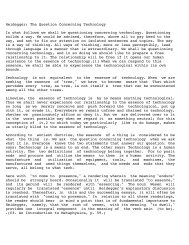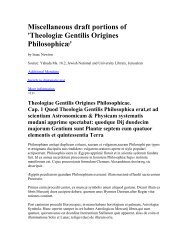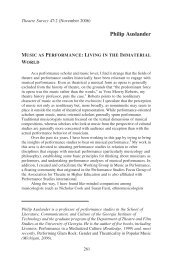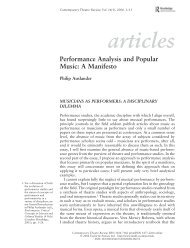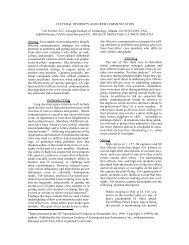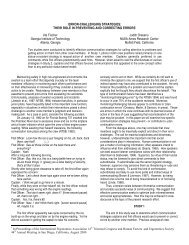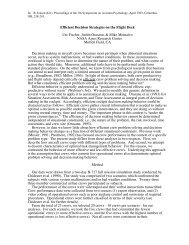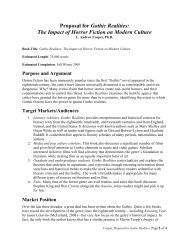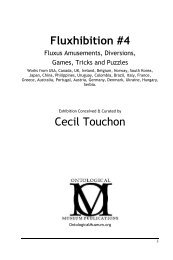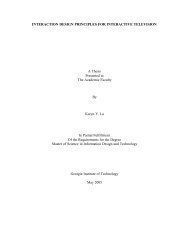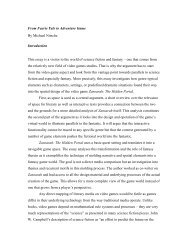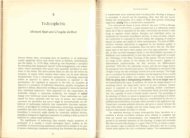william t. costello, sj - The School of Literature, Communication, and ...
william t. costello, sj - The School of Literature, Communication, and ...
william t. costello, sj - The School of Literature, Communication, and ...
You also want an ePaper? Increase the reach of your titles
YUMPU automatically turns print PDFs into web optimized ePapers that Google loves.
THE FRAMEWORK OF SCHOLASTICISM 13<br />
recent masters were available in print, <strong>and</strong> to prepare oneself for<br />
the it<br />
disputations, was simpler <strong>and</strong> more comfortable to repair<br />
to a tutor's chambers <strong>and</strong> borrow his marked copy. Briefly, as<br />
scholasticism, the philosophy <strong>of</strong> the schools, became more <strong>and</strong><br />
more the philosophy <strong>of</strong> the library, the lecturer in the schools<br />
became correspondingly outmoded.<br />
<strong>The</strong> lectures themselves were either public or private. <strong>The</strong><br />
<strong>of</strong> the<br />
public lectures (in scholis) were held under the auspices<br />
University in the Old <strong>School</strong>s, a series <strong>of</strong> buildings near the present<br />
Senate House. Private lectures were those held by the college<br />
in the dining hall, the chapel, or in a tutor's rooms. <strong>The</strong>re were<br />
by statute four public lectures a week in theology, civil law, medicine,<br />
<strong>and</strong> mathematics, while lecturers in language, philosophy,<br />
dialectics, <strong>and</strong> rhetoric were held to five lectures, "unless a feast<br />
day intervene/' 17 <strong>The</strong> lectures ran for an hour, from seven until<br />
eight in the morning. Anyone who has experienced the damp cold<br />
<strong>of</strong> a winter's morning at Cambridge will not want to look further<br />
than to the early hour <strong>of</strong> the exercise, held in an unheated <strong>and</strong><br />
gloomy barn, for the falling <strong>of</strong>f <strong>of</strong> attendance <strong>and</strong> "the uncumly<br />
Hemminge 8c hauking at publick lectures . . ." 1S <strong>The</strong>se early<br />
morning faces had to show somehow how unwillingly they had<br />
crept to the schools.<br />
In the will (161 1) <strong>of</strong> John Cowell, Master <strong>of</strong> Trinity Hall, there<br />
is provision "towards the perpetuall maintenance <strong>of</strong> an logic lec-<br />
ture . . ." 19 in his college. <strong>The</strong> will is important for two reasons:<br />
first, an experienced <strong>and</strong> very able master expresses his faith in<br />
the lecture system, <strong>and</strong>, secondly, he gives the details <strong>of</strong> its ideal<br />
operation. Cowell's logic lecture was to be read "fower dayes every<br />
week at the least in Term time, <strong>and</strong> two hours every day viz:<br />
from six to eight in the . . morning ." <strong>The</strong> first hour "I will to<br />
be bestowed in the examining the former days lecture, & In in-<br />
structing the auditors, how to make use <strong>of</strong> logique by objecting<br />
& answering one the other." This "repetitio" as it was called,<br />
was to be followed by a "praelectio" that is, a second hour ". . . to<br />
be bestowed in delivering a new lecture, in such deliberate man-<br />
ner, that the auditors may take it by yr penn<br />
from his mouth .<br />
. ."<br />
Extending the lecture to two hours <strong>and</strong> joining it to the repetition<br />
was a step in the right direction, for heret<strong>of</strong>ore student participa-<br />
tion seems to have been largely confined to separate disputations<br />
<strong>and</strong> discussions with one's tutor or chamber-fellow.<br />
When Cowell speaks <strong>of</strong> taking down the lecture by "penn from<br />
his mouth" he is describing the practice called "diting." <strong>The</strong> ad*



